Your Pgc1a mitochondrial biogenesis images are available in this site. Pgc1a mitochondrial biogenesis are a topic that is being searched for and liked by netizens today. You can Find and Download the Pgc1a mitochondrial biogenesis files here. Find and Download all free vectors.
If you’re searching for pgc1a mitochondrial biogenesis images information linked to the pgc1a mitochondrial biogenesis keyword, you have pay a visit to the ideal site. Our website always provides you with hints for refferencing the maximum quality video and picture content, please kindly surf and locate more informative video content and graphics that fit your interests.
Pgc1a Mitochondrial Biogenesis. The peroxisome proliferator-activated receptor gamma coactivator-1alpha PGC-1alpha has been s. While many factors have been linked to the development of cellular senescence mitochondrial dysfunction has emerged as an important causative factor. PGC-1α is suggested to be a potent stimulator of mitochondrial biogenesis and a powerful regulator of ROS metabolism. NRF-1 was an initial transcription factor target identified for the induction of mitochondrial biogenesis by PGC-1α Fig.
 Pgc1a A Key Regulator Of Mitochondrial Biogenesis Is Regulated By Download Scientific Diagram From researchgate.net
Pgc1a A Key Regulator Of Mitochondrial Biogenesis Is Regulated By Download Scientific Diagram From researchgate.net
Recent work highlighted that PGC1α can also modulate the composition and functions of individual mitochondria. In cell lines PGC1A inhibition decreased mtDNA copy number p0032 while MYC inhibition had no effect p0229. Therefore it is emerging that PGC1α is controlling global oxidative metabolism by per. PGC-1α can trans -activate NRF-1 target genes and a dominant negative allele of NRF-1 blocks the effects of PGC-1α on mitochondrial biogenesis. PGC-1α is a master regulator of mitochondrial biogenesis and an attractive therapeutic target. Importantly the expression of PGC1α is highly inducible by physiological cues including exercise cold and fasting Handschin and Spiegelman 2006.
In the experiment leading to the discovery of PGC-1α mice were exposed to the cold 4C which induced an increase in PGC-1α mRNA expression in thermogenic tissues namely brown fat.
PGC1A may contribute to enhanced mtDNA copy number which predicts disease aggressiveness and inferior survival outcome. PGC1α is a positive regulator of mitochondrial biogenesis and respiration adaptive thermogenesis gluconeogenesis as well as many other metabolic processes Handschin and Spiegelman 2006. Peroxisome proliferator-activated receptor γ coactivator 1α PGC-1α has emerged as a master regulator of mitochondrial biogenesis and function thus becoming a crucial metabolic node. Mitochondrial derangements are common features of both AKI and CKD and mitochondria-targeting therapies are under study as nephroprotective agents. Recent studies indicate that regulation of cellular oxidative capacity through enhancing mitochondrial biogenesis may be beneficial for neuronal recovery and survival in human neurodegenerative disorders. Therefore it is emerging that PGC1α is controlling global oxidative metabolism by per.
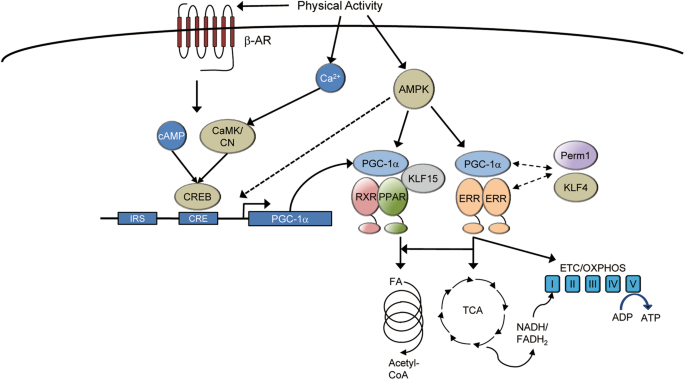 Source: nature.com
Source: nature.com
PGC-1α is a master regulator of mitochondrial biogenesis and an attractive therapeutic target. In this study we uncovered that the mitochondrial biogenesis pathway driven by the mammalian target of rapamycinperoxisome proliferator-activated receptor-γ complex 1αβ mTORPGC-1αβ axis is markedly upregulated in senescent lung. PGC-1α is a major regulator of mitochondrial biogenesis that had been discovered after the NFRs nuclear respiratory factors 1 and 2 and Tfam mitochondrial transcription factor A. A significant reduction in the PGC-1α transcript and protein levels in 4T1 B16F10 and MDA-MB-231 cells resulted in suppressed mitochondrial biogenesis as assessed by reduced mitochondrial. PGC-1α is a master regulator of mitochondrial biogenesis and an attractive therapeutic target.
 Source: researchgate.net
Source: researchgate.net
Recent studies indicate that regulation of cellular oxidative capacity through enhancing mitochondrial biogenesis may be beneficial for neuronal recovery and survival in human neurodegenerative disorders. PGC1α is a transcriptional coactivator that is a central inducer of mitochondrial biogenesis in cells. A significant reduction in the PGC-1α transcript and protein levels in 4T1 B16F10 and MDA-MB-231 cells resulted in suppressed mitochondrial biogenesis as assessed by reduced mitochondrial. We present an overview of the mechanisms by which PGC-1α is regulated including the transcriptional regulation of PGC-1α expression and the fine-tuning of its final activity via posttranslational modifications. Importantly the expression of PGC1α is highly inducible by physiological cues including exercise cold and fasting Handschin and Spiegelman 2006.
 Source: researchgate.net
Source: researchgate.net
PGC-1α is a major regulator of mitochondrial biogenesis that had been discovered after the NFRs nuclear respiratory factors 1 and 2 and Tfam mitochondrial transcription factor A. Low PGC-1α levels and decreased transcription of its gene targets have been observed in both preclinical AKI nephrotoxic endotoxemia and ischemia-reperfusion and in experimental and human CKD most notably diabetic nephropathy. PGC-1α can trans -activate NRF-1 target genes and a dominant negative allele of NRF-1 blocks the effects of PGC-1α on mitochondrial biogenesis. Also known as mtTFA. Importantly the expression of PGC1α is highly inducible by physiological cues including exercise cold and fasting Handschin and Spiegelman 2006.
 Source: researchgate.net
Source: researchgate.net
PGC1A may contribute to enhanced mtDNA copy number which predicts disease aggressiveness and inferior survival outcome. Regulation of mitochondrial biogenesis by PGC-1αMitochondrial biogenesis is regulated by the nuclear transcription factors NRF1 and NRF2 as well as ERRα. Together with SIRT1 PGC1α has been reported to reside inside mitochondria with direct functions on mitochondrial biofunction. PGC-1α can trans -activate NRF-1 target genes and a dominant negative allele of NRF-1 blocks the effects of PGC-1α on mitochondrial biogenesis. Peroxisome proliferator-activated receptor PPAR-γ coactivator PGC-1α is a transcription coactivator that interacts with a broad range of transcription factors that are involved in a wide variety of biological responses including adaptive thermogenesis mitochondrial biogenesis glucosefatty acid metabolism fiber type switching in skeletal muscle and heart development.

Also known as mtTFA. Although PGC-1α stimulates mitochondrial biogenesis and energy metabolism it suppresses ROS production in cells through induction of ROS-detoxifying enzymes. PGC1A may contribute to enhanced mtDNA copy number which predicts disease aggressiveness and inferior survival outcome. These results suggested that mitochondrial numbers andor mitochondrial biogenesis via the PGC-1αTFAM pathway may decrease in musculoskeletal malignancies and that. PGC-1α is a major regulator of mitochondrial biogenesis that had been discovered after the NFRs nuclear respiratory factors 1 and 2 and Tfam mitochondrial transcription factor A.
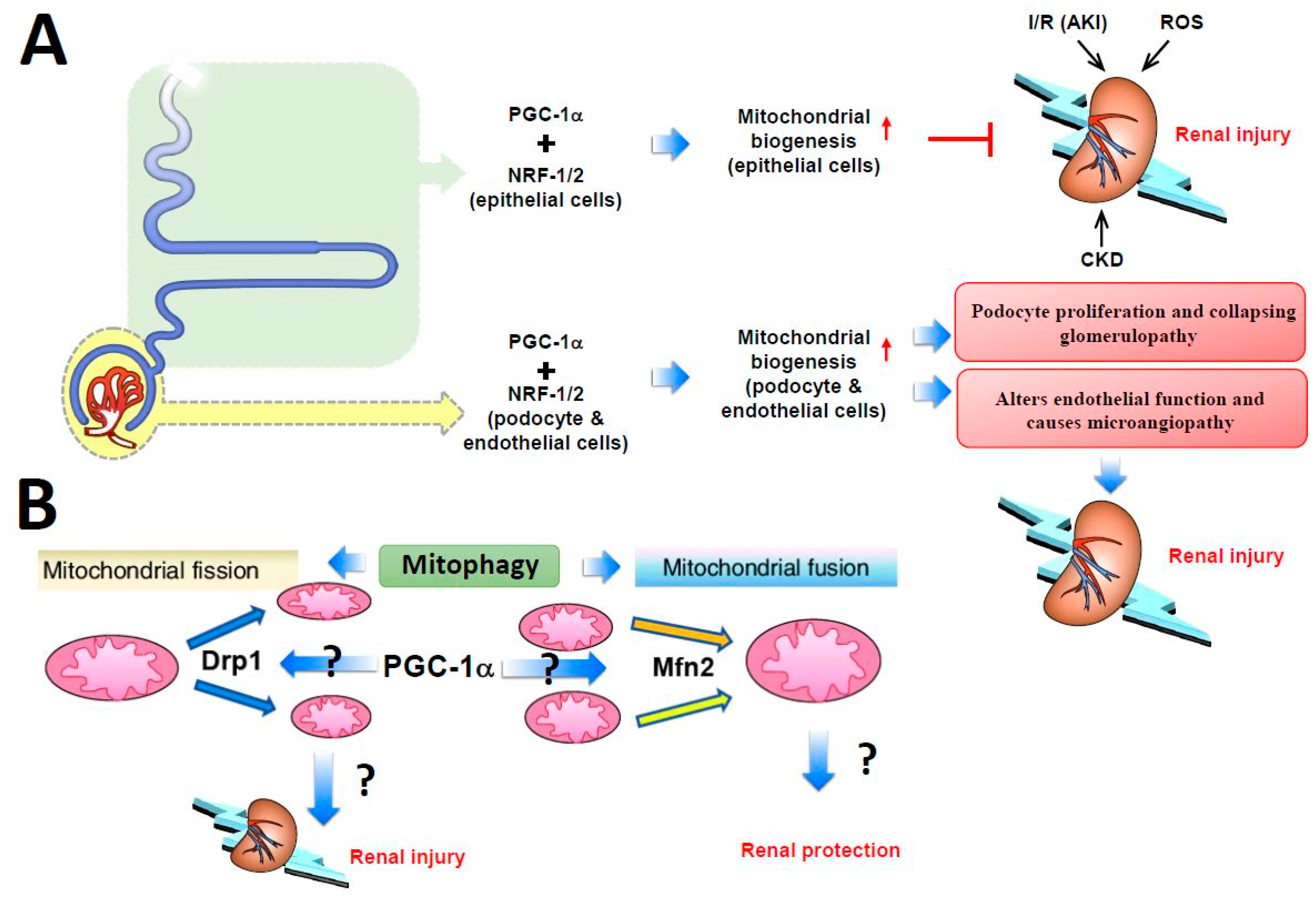 Source: mdpi.com
Source: mdpi.com
Peroxisome proliferator-activated receptor γ coactivator 1α PGC-1α has emerged as a master regulator of mitochondrial biogenesis and function thus becoming a crucial metabolic node. The peroxisome proliferator-activated receptor. Peroxisome proliferator-activated receptor γ coactivator 1α PGC-1α has emerged as a master regulator of mitochondrial biogenesis and function thus becoming a crucial metabolic node. CKD predisposes to acute kidney injury AKI and AKI favors CKD progression. In this study we uncovered that the mitochondrial biogenesis pathway driven by the mammalian target of rapamycinperoxisome proliferator-activated receptor-γ complex 1αβ mTORPGC-1αβ axis is markedly upregulated in senescent lung.
 Source: researchgate.net
Source: researchgate.net
Peroxisome proliferator-activated receptor- γ coactivator PGC-1 α is a transcriptional coactivator described as a master regulator of mitochondrial biogenesis and function including oxidative phosphorylation and reactive oxygen species detoxification. While many factors have been linked to the development of cellular senescence mitochondrial dysfunction has emerged as an important causative factor. Peroxisome proliferator-activated receptor PPAR-γ coactivator PGC-1α is a transcription coactivator that interacts with a broad range of transcription factors that are involved in a wide variety of biological responses including adaptive thermogenesis mitochondrial biogenesis glucosefatty acid metabolism fiber type switching in skeletal muscle and heart development. Peroxisome proliferator-activated receptor- γ coactivator PGC-1 α is a transcriptional coactivator described as a master regulator of mitochondrial biogenesis and function including oxidative phosphorylation and reactive oxygen species detoxification. In this study we uncovered that the mitochondrial biogenesis pathway driven by the mammalian target of rapamycinperoxisome proliferator-activated receptor-γ complex 1αβ mTORPGC-1αβ axis is markedly upregulated in senescent lung.
 Source: researchgate.net
Source: researchgate.net
Peroxisome proliferator-activated receptor γ coactivator 1α PGC-1α has emerged as a master regulator of mitochondrial biogenesis and function thus becoming a crucial metabolic node. The peroxisome proliferator-activated receptor gamma coactivator-1alpha PGC-1alpha has been s. Low PGC-1α levels and decreased transcription of its gene targets have been observed in both preclinical AKI nephrotoxic endotoxemia and ischemia-reperfusion and in experimental and human CKD most notably diabetic nephropathy. In cell lines PGC1A inhibition decreased mtDNA copy number p0032 while MYC inhibition had no effect p0229. PGC1α is a transcriptional coactivator that is a central inducer of mitochondrial biogenesis in cells.

PGC1A may contribute to enhanced mtDNA copy number which predicts disease aggressiveness and inferior survival outcome. PGC1α is a positive regulator of mitochondrial biogenesis and respiration adaptive thermogenesis gluconeogenesis as well as many other metabolic processes Handschin and Spiegelman 2006. In this study we uncovered that the mitochondrial biogenesis pathway driven by the mammalian target of rapamycinperoxisome proliferator-activated receptor-γ complex 1αβ mTORPGC-1αβ axis is markedly upregulated in senescent lung. These results suggested that mitochondrial numbers andor mitochondrial biogenesis via the PGC-1αTFAM pathway may decrease in musculoskeletal malignancies and that. While many factors have been linked to the development of cellular senescence mitochondrial dysfunction has emerged as an important causative factor.
 Source: researchgate.net
Source: researchgate.net
Importantly the expression of PGC1α is highly inducible by physiological cues including exercise cold and fasting Handschin and Spiegelman 2006. The peroxisome proliferator-activated receptor gamma coactivator-1alpha PGC-1alpha has been s. PGC-1α is suggested to be a potent stimulator of mitochondrial biogenesis and a powerful regulator of ROS metabolism. Peroxisome proliferator-activated receptor γ coactivator 1α PGC-1α has emerged as a master regulator of mitochondrial biogenesis and function thus becoming a crucial metabolic node. In this study we uncovered that the mitochondrial biogenesis pathway driven by the mammalian target of rapamycinperoxisome proliferator-activated receptor-γ complex 1αβ mTORPGC-1αβ axis is markedly upregulated in senescent lung.
 Source: researchgate.net
Source: researchgate.net
Mitochondrial derangements are common features of both AKI and CKD and mitochondria-targeting therapies are under study as nephroprotective agents. Importantly the expression of PGC1α is highly inducible by physiological cues including exercise cold and fasting Handschin and Spiegelman 2006. PGC1A may contribute to enhanced mtDNA copy number which predicts disease aggressiveness and inferior survival outcome. Recent studies indicate that regulation of cellular oxidative capacity through enhancing mitochondrial biogenesis may be beneficial for neuronal recovery and survival in human neurodegenerative disorders. Peroxisome proliferator-activated receptor γ coactivator 1α PGC-1α has emerged as a master regulator of mitochondrial biogenesis and function thus becoming a crucial metabolic node.
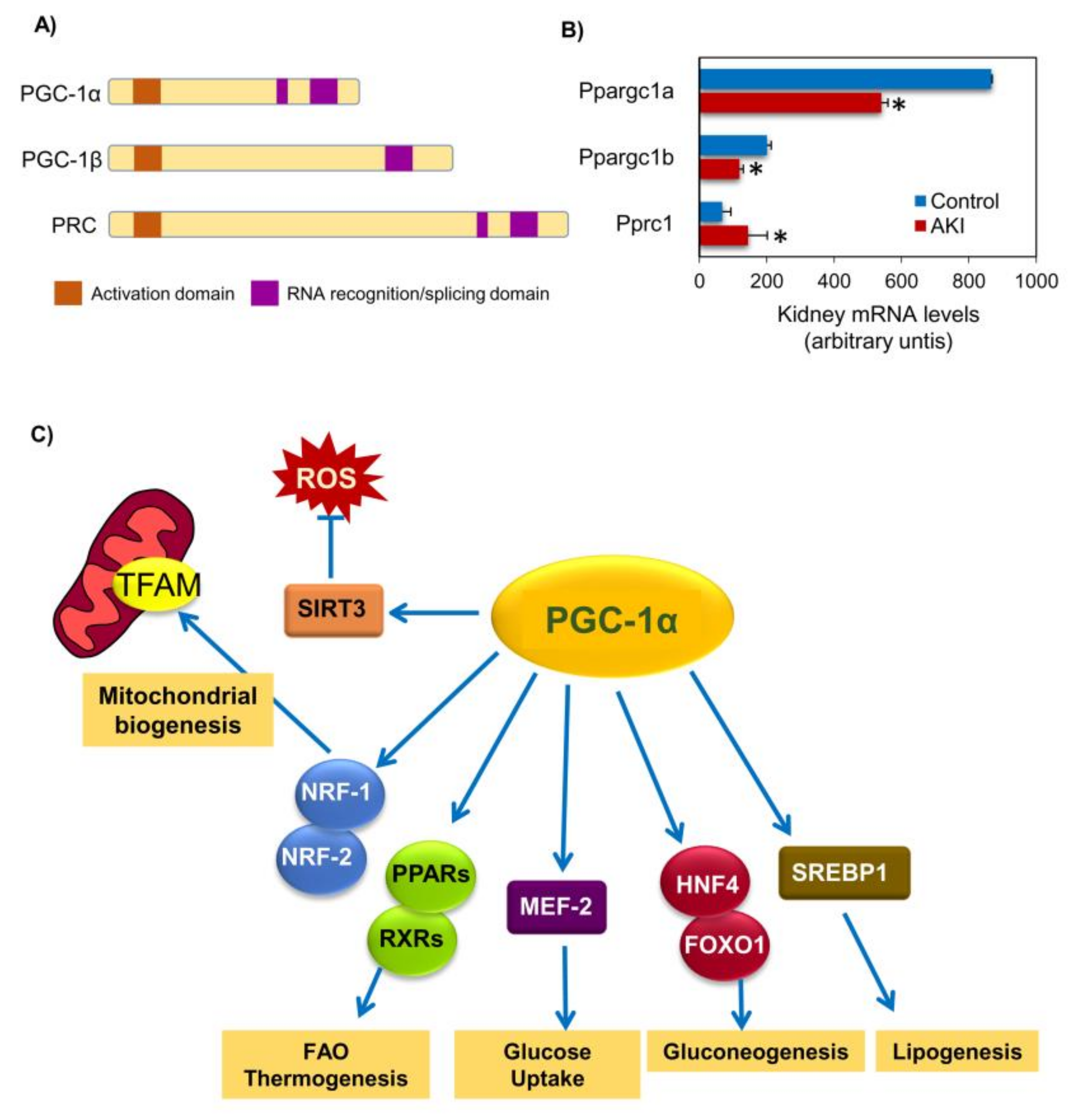 Source: mdpi.com
Source: mdpi.com
Recent work highlighted that PGC1α can also modulate the composition and functions of individual mitochondria. PGC-1α is a master regulator of mitochondrial biogenesis and an attractive therapeutic target. A significant reduction in the PGC-1α transcript and protein levels in 4T1 B16F10 and MDA-MB-231 cells resulted in suppressed mitochondrial biogenesis as assessed by reduced mitochondrial. PGC-1α is a master regulator of mitochondrial biogenesis and an attractive therapeutic target. The peroxisome proliferator-activated receptor.
 Source: researchgate.net
Source: researchgate.net
Also known as mtTFA. PGC-1α is a master regulator of mitochondrial biogenesis and an attractive therapeutic target. In the experiment leading to the discovery of PGC-1α mice were exposed to the cold 4C which induced an increase in PGC-1α mRNA expression in thermogenic tissues namely brown fat. The peroxisome proliferator-activated receptor. PGC1A may contribute to enhanced mtDNA copy number which predicts disease aggressiveness and inferior survival outcome.
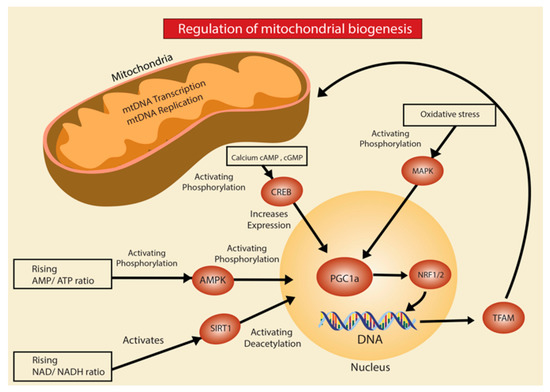 Source: mdpi.com
Source: mdpi.com
PGC1α is a positive regulator of mitochondrial biogenesis and respiration adaptive thermogenesis gluconeogenesis as well as many other metabolic processes Handschin and Spiegelman 2006. PGC1α is a positive regulator of mitochondrial biogenesis and respiration adaptive thermogenesis gluconeogenesis as well as many other metabolic processes Handschin and Spiegelman 2006. The peroxisome proliferator-activated receptor gamma coactivator-1alpha PGC-1alpha has been s. While many factors have been linked to the development of cellular senescence mitochondrial dysfunction has emerged as an important causative factor. PGC1α is a transcriptional coactivator that is a central inducer of mitochondrial biogenesis in cells.
 Source: researchgate.net
Source: researchgate.net
PGC-1α is a master regulator of mitochondrial biogenesis and an attractive therapeutic target. A significant reduction in the PGC-1α transcript and protein levels in 4T1 B16F10 and MDA-MB-231 cells resulted in suppressed mitochondrial biogenesis as assessed by reduced mitochondrial. Also known as mtTFA. Peroxisome proliferator-activated receptor PPAR-γ coactivator PGC-1α is a transcription coactivator that interacts with a broad range of transcription factors that are involved in a wide variety of biological responses including adaptive thermogenesis mitochondrial biogenesis glucosefatty acid metabolism fiber type switching in skeletal muscle and heart development. While many factors have been linked to the development of cellular senescence mitochondrial dysfunction has emerged as an important causative factor.
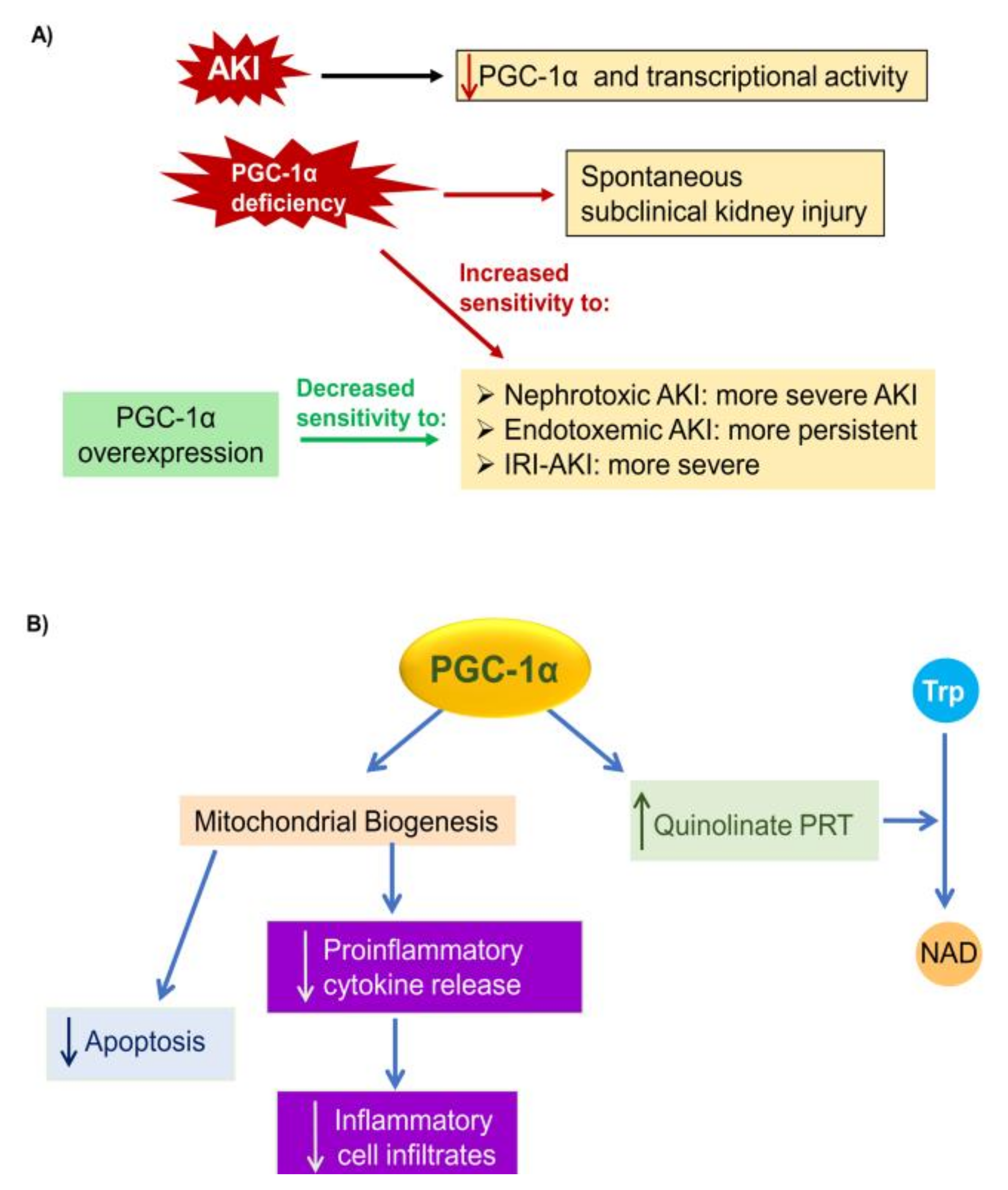 Source: mdpi.com
Source: mdpi.com
Peroxisome proliferator-activated receptor PPAR-γ coactivator PGC-1α is a transcription coactivator that interacts with a broad range of transcription factors that are involved in a wide variety of biological responses including adaptive thermogenesis mitochondrial biogenesis glucosefatty acid metabolism fiber type switching in skeletal muscle and heart development. The peroxisome proliferator-activated receptor gamma coactivator-1alpha PGC-1alpha has been s. While many factors have been linked to the development of cellular senescence mitochondrial dysfunction has emerged as an important causative factor. Regulation of mitochondrial biogenesis by PGC-1αMitochondrial biogenesis is regulated by the nuclear transcription factors NRF1 and NRF2 as well as ERRα. The co-transcriptional regulator PGC-1α interacts with them and thereby is a key regulator of mitochondrial biogenesis.
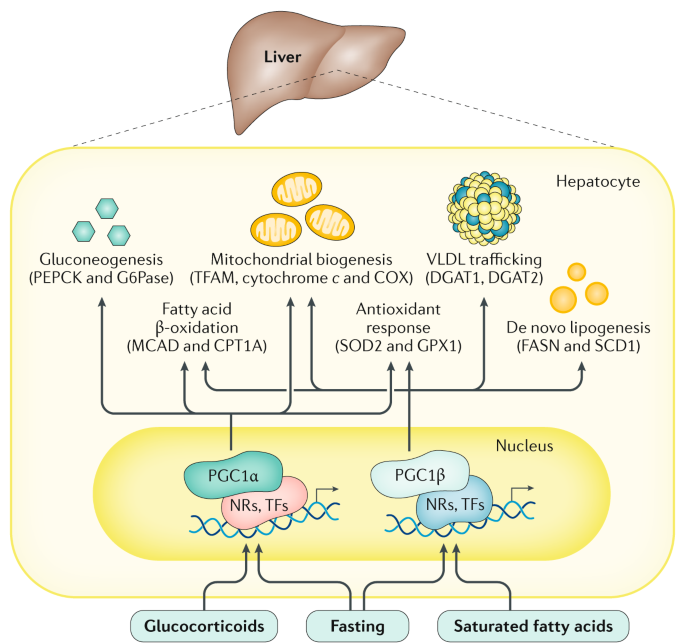 Source: nature.com
Source: nature.com
NRF-1 was an initial transcription factor target identified for the induction of mitochondrial biogenesis by PGC-1α Fig. While many factors have been linked to the development of cellular senescence mitochondrial dysfunction has emerged as an important causative factor. PGC-1α is a master regulator of mitochondrial biogenesis and an attractive therapeutic target. A significant reduction in the PGC-1α transcript and protein levels in 4T1 B16F10 and MDA-MB-231 cells resulted in suppressed mitochondrial biogenesis as assessed by reduced mitochondrial. Peroxisome proliferator-activated receptor γ coactivator 1α PGC-1α has emerged as a master regulator of mitochondrial biogenesis and function thus becoming a crucial metabolic node.

While many factors have been linked to the development of cellular senescence mitochondrial dysfunction has emerged as an important causative factor. PGC1α is a transcriptional coactivator that is a central inducer of mitochondrial biogenesis in cells. Regulation of mitochondrial biogenesis by PGC-1αMitochondrial biogenesis is regulated by the nuclear transcription factors NRF1 and NRF2 as well as ERRα. PGC-1α is a master regulator of mitochondrial biogenesis and an attractive therapeutic target. Importantly the expression of PGC1α is highly inducible by physiological cues including exercise cold and fasting Handschin and Spiegelman 2006.
This site is an open community for users to submit their favorite wallpapers on the internet, all images or pictures in this website are for personal wallpaper use only, it is stricly prohibited to use this wallpaper for commercial purposes, if you are the author and find this image is shared without your permission, please kindly raise a DMCA report to Us.
If you find this site serviceableness, please support us by sharing this posts to your own social media accounts like Facebook, Instagram and so on or you can also save this blog page with the title pgc1a mitochondrial biogenesis by using Ctrl + D for devices a laptop with a Windows operating system or Command + D for laptops with an Apple operating system. If you use a smartphone, you can also use the drawer menu of the browser you are using. Whether it’s a Windows, Mac, iOS or Android operating system, you will still be able to bookmark this website.





